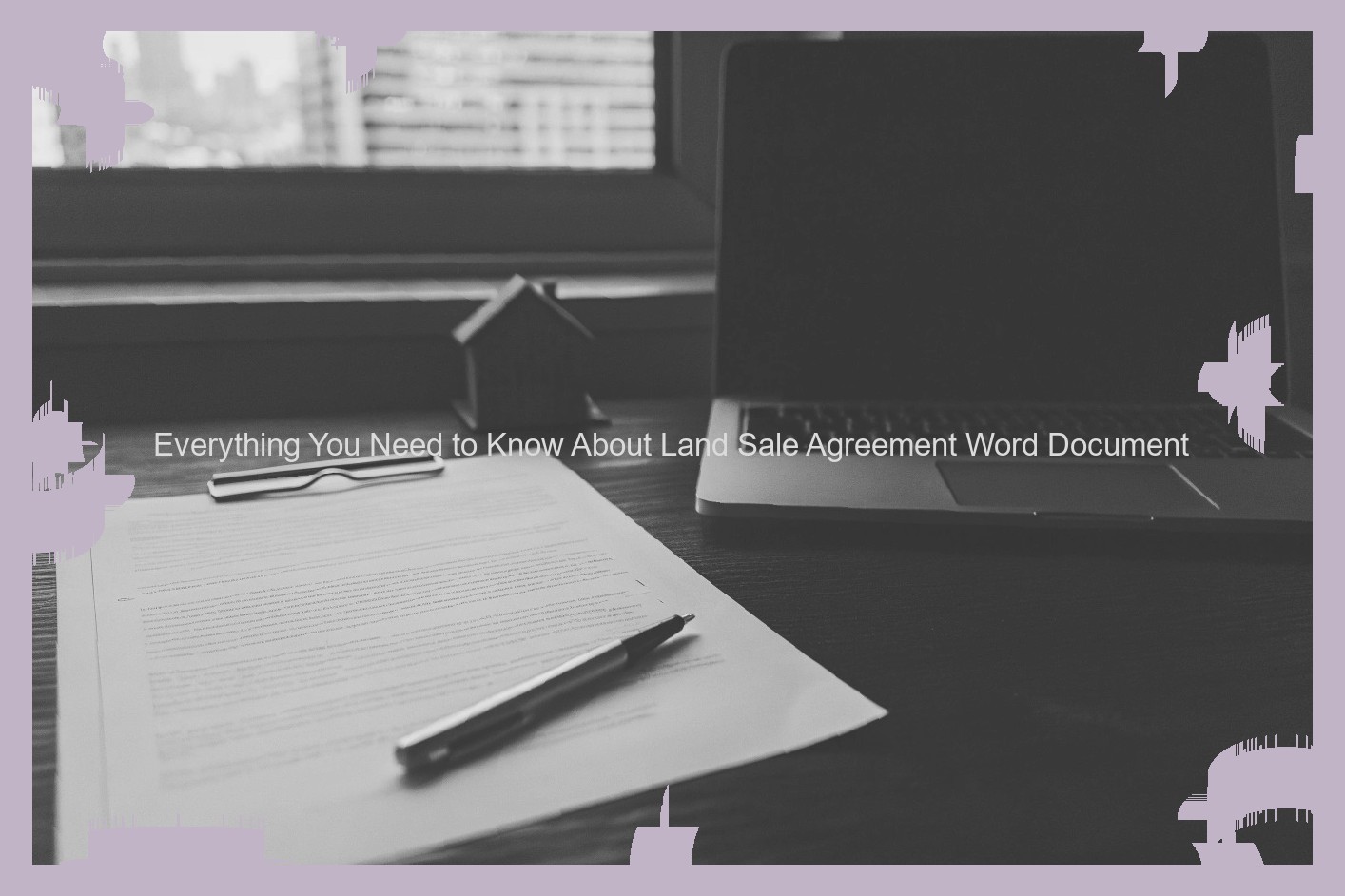What’s a Land Sale Agreement?
When it comes to real estate, the vast majority of people have heard of a ‘contract’. Most people also know that a contract is a binding agreement between two parties that holds some weight of legality. However, how many people are able to clearly define a ‘land sale agreement’? What is the difference between a simple agreement and a land sale agreement?
A land sale agreement is a form of contract that is dedicated specifically to matters of real property. The agreement lays out the specifics of a deal involving the sale of property in the real estate market. The purpose of the land sale agreement is to provide a basic set of terms that act as the basis for a purchase contract. The agreement will cover the basics of the sale such as down payment , terms of sale and other repairs that need to be completed on the property prior to sale.
By signing an agreement the buyer and seller are entering into a real estate transaction. A signed agreement will legally bind the parties in the transaction to the terms that are laid out in the land sale agreement. If either party does not fulfill their end of the agreement they can then be liable for any damages that are caused by their failure to complete their end of the deal.

Land Sale Agreement Essentials
A land sale agreement is an intricate document containing essential information pertinent to the sale of a piece of land. Any land sale agreement, however simple, should contain certain elements: The Parties: This section of the document contains the names of the buyer and seller. Providing names and addresses for all parties is vital to ensuring the execution of the document. Description of the Property: This element of a land sale agreement provides information about the property to be sold and includes a description of the parcel itself, as well as any easement, rights or other privileges that may be part of the property’s sale. For example, if the land has access to water or includes any access to public utilities, this information should be contained in the property description section. Purchase Price: The price that is agreed to for the parcel of land. The purchase price should be negotiated between the parties and accommodated within the land sale agreement. Payment Terms: This element outlines how payment for the land will be made, stipulating when and how the buyer is able to make payments for the land. Many payment terms commonly stipulate that the buyer will either pay for the land outright upon closing or pay a set amount per month until the remaining purchase amount is fulfilled. The payment terms must also extend to the interest on any obligations or seller financing agreements. Contingencies and Closing Provisions: This section of the land sale agreement generally contains two parts: any contingencies necessary for the sales agreement to be valid and closing procedures for the land itself. Contingencies should outline any obligations the buyer must meet before closing on the deal, such as acquiring financing from a bank or undergoing a survey on the land. Closing provisions detail the necessary steps that both parties must take to fulfill the agreement and complete the transfer of ownership.
How to Draft a Land Sale Agreement in Word
The process of drafting a land sale agreement in Microsoft Word can be quite simple. It requires you to review the relevant details and information about the transaction and fill in the necessary fields throughout the drafted agreement. Once drafted, you must also review your agreement for drafting errors. Below follows a guide on how you can successfully draft a land sale agreement by using Microsoft Word:
Open a New Document Open the Word application and select the option "Blank Document." In this way, you will be able to draft a new document which is free of any prior drafts or editing. You will then be asked to customize your web browser settings. If you do not want to change these settings, you will need to select the option labelled "No."
Search the Templates Tab A new subsection will be shown labelled "Search for Online Templates," within the "New Document" tab. Click on the search bar and write "Land Sale Agreement." A number of land sale agreement templates will be shown. Select the one which you approve of the most and download it.
Fill in the Appropriate Fields Your Word document should contain a schedule of the property which you are selling to the buyer. This is known as the property schedule and it contains information such as the size of the land being sold, the area of jurisdiction it falls in and of course, the address of the land. Take care to ensure that you fill in the correct information in the right fields and avoid adding in any other information which is not required in these fields. For example, the property description does not need information about the type of land which you are buying, such as whether it is "coconut farm land" or "agricultural land." The next step would be to enter the names of the buyer and seller into the appropriate fields followed by the sale price of the property. You could also include any statutory conditions which may apply to your sale. For example, if you are selling agricultural land, you could include the requirement that the purchaser is expected to start farming of the land immediately after the sale.
Check for Drafting Errors It is very important to check the drafted agreement for any drafting errors. You must pay special attention to the property schedule and make sure that the land which you are intending to sell is accurately described in the agreement. Also check for any word as well as grammar errors which may be present. One important aspect to remember is to ensure that the property description in the agreement matches the property descriptions in the title deed for the land being sold.
Legal Implications and Common Mistakes
When creating a land sale agreement, there are a number of legal considerations to keep in mind. First and foremost, it is essential that both parties are legally competent to enter into a contract. This means that they must be of legal age, of sound mind, and capable of understanding the obligations and rights outlined in the agreement. It is also crucial to make sure that the land being sold is legally owned by the seller without any encumbrances (such as liens) unless otherwise specified in the agreement. The agreement should also clearly outline the obligations of both parties, including the purchase price, payment terms , and any contingencies (such as obtaining financing or zoning approvals). One common pitfall when creating a land sale agreement is failing to include a legal description of the property being sold. The legal description should be a complete and accurate representation of the boundaries of the property and should be referenced in the agreement. Additionally, failing to include a contingency clause can create unnecessary problems in the future if either the buyer or seller needs to back out of the deal for a valid reason. Another potential issue is failing to include a provision for what happens in the event of a dispute, or what the process will be for resolving that dispute. This could mean additional time and money spent on legal proceedings down the line. It’s important to note that land sale agreements may also be subject to local laws and regulations, so it’s crucial to do your due diligence before entering into any deal.
Using Templates for Your Land Sale Agreement
The use of templates can be a convenient way for parties to ensure the important terms of a land sale agreement are included in the final version of the document. Alternatively, templates can be useful for parties who are less familiar with the land sale process. If this is your first time buying or selling land and you are using a template document, there are things that you should remember to do to customize the template land sale agreement for your specific transaction and to guarantee it will be legally enforceable.
As with any template document, you need to ensure that you review the terms of the template to ensure that they are appropriate for your specific transaction. For example, most land sale agreements will provide a date of closing, which is when conveyance of the land will occur from the seller to the buyer. However, in certain situations, the parties may wish to provide milestones that must be reached by a certain date prior to conveyance or might wish to list some contingencies that must be met or waived prior to closing. Depending on state laws, an agreement that does not involve a date for closing may not be enforceable.
Another important consideration with any template document is to ensure that the appropriate sections for your transaction are included or excluded from the final version of the land sale agreement. For example, most land sale agreements will include a section concerning title to the land being sold. The seller will typically warrant that a (sometimes, although not always, a current) title search has been completed and that they have good title to the land. In some instances, though, the parties may agree to a different arrangement. The parties may agree that a title search setting out the current status of title is satisfactory and that the purchase price reflects this status. Alternatively, the buyer may agree to take title to the property subject to certain outstanding liens or encumbrances with the understanding that the seller will take steps to have these liens or encumbrances removed following closing. In these cases, the title section could require modification.
Regardless of whether you are using a template land sale agreement or a document that was drafted specifically for your transaction, you would be wise to consult a legal professional to ensure that the document accurately conveys all of the terms between you and the other party and is enforceable under state law.
Land Sale Agreement FAQs
Q: May I draft my own land sale agreement?
A: Yes, but it is never advisable to do so unless you are a qualified real estate attorney licensed in the state where the property is located. Drafting a land sale agreement and related documents may seem simple but there are many unknowns that only a real estate attorney is qualified to handle. You don’t want to have future problems that could have been prevented by seeking proper legal counsel.
Q: How can a land sale agreement be enforced?
A: As long as the land sale agreement is properly drafted and signed by each party, it is enforceable. However, unfortunately, many issues with the property or the parties arise after the land sale agreement is signed. For example, one party doesn’t have good title and the other thought he did . The parties may have different ideas about what should be taken care of with the property before the sale. During negotiations, one party may promise to do something and then never does. If parties can’t agree, a court may need to enforce the terms of the land sale agreement.
Q: What happens to the land sale agreement if either party breaches the contract?
A: First, determine if the land sale agreement actually includes provisions relating to a breach of contract. If it does, then those provisions must be followed. For example, the contract may say that if the buyer doesn’t obtain funding for the property in a certain amount of time, the seller can all the first payment. Then, the seller can reclaim the land for his own use. If the land sale agreement doesn’t include terms relating to a breach of contract, state law may kick in and relieve the injured party of some blame.


